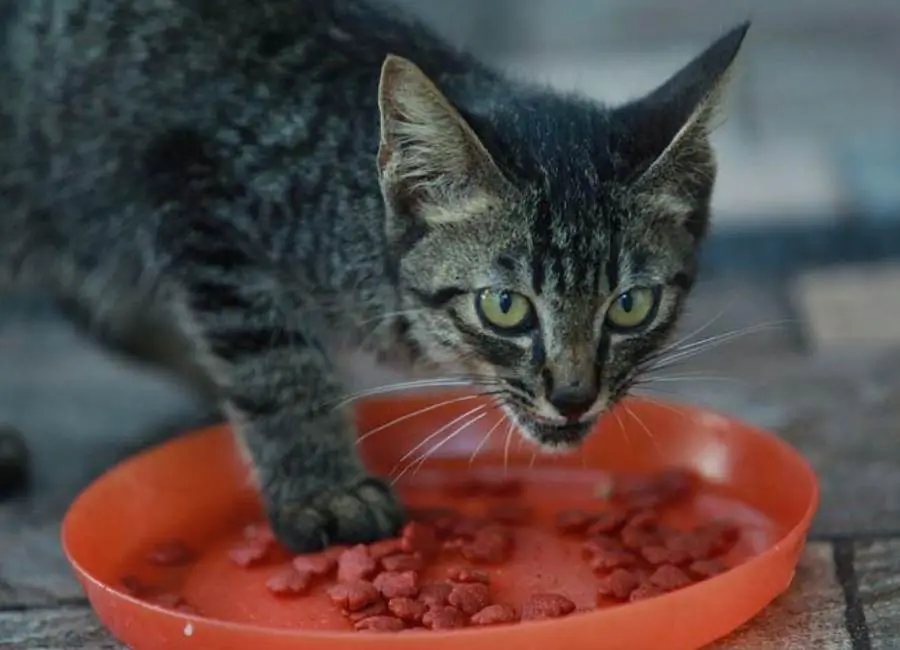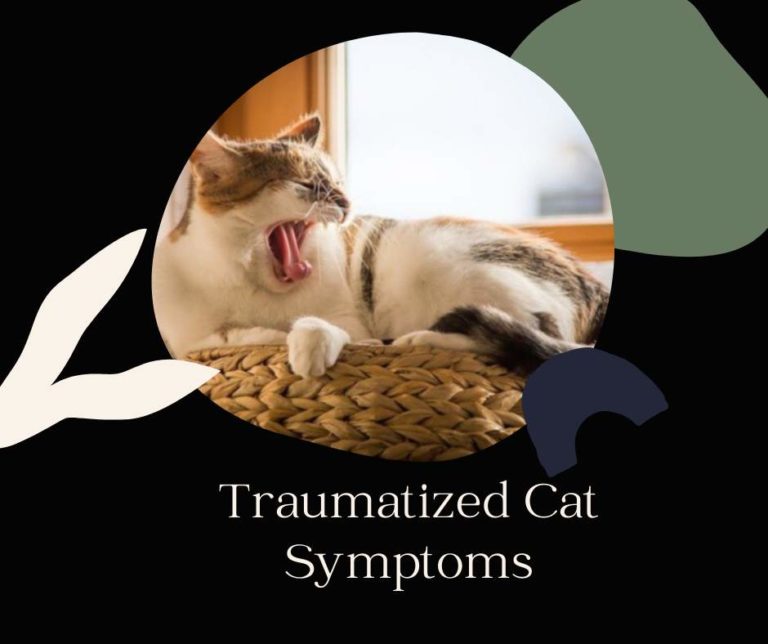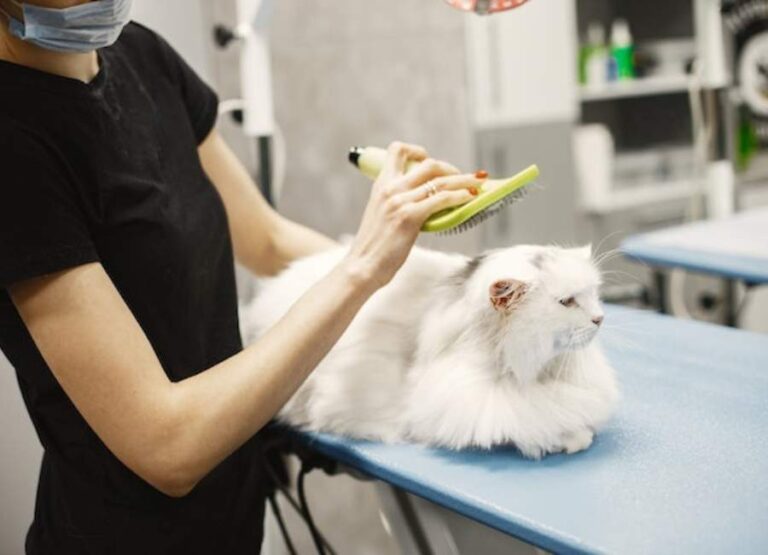11 Potential Reasons Why Cats Stop Eating & Tips

There are many reasons why your cat might stop eating. While some are easy to fix, others require a trip to the vet or even an emergency hospital visit.
In this article, we’ll discuss some of the most common reasons why cats quit eating and what you can do about it.
Why Cats Stop Eating
Cats may stop eating due to a variety of reasons, including changes in their food or routine, illness, dental disease, stress or anxiety, an underlying disease, an upset stomach, or food being placed near something that frightens them.
Loss of appetite is one of the key clues that something is wrong, so it’s important to pay attention if your cat suddenly stops eating.
If you’re concerned about your cat’s appetite or behavior, it’s best to consult with a veterinarian to help diagnose and treat any potential issues.
Reasons Why Cats Stop Eating

Here are some common reasons why cats stop eating:
Intestinal issues
A cat’s appetite may be affected by intestinal issues like pancreatitis or inflammatory bowel disease.
These illnesses cause the digestive tract to inflame, which results in pain, discomfort, and nausea.
Weight loss, vomiting, and diarrhea are some more signs of digestive issues in cats.
Cats may experience health issues that make it challenging for them to eat as they get older.
Older cats may experience difficulty chewing or swallowing, or they may lose their sense of smell, all of which can have an impact on their hunger.
Senior cats want food that is simple to chew and strongly scented, so be sure you do so.
Too much stress
Stress is the number one reason why cats stop eating.
If you’ve recently moved or had a change in your environment, it’s possible that your cat is feeling stressed out.
Changes like these can cause them to feel anxious and distracted, which may cause them to stop eating as a way of coping with their emotions.
Read more: 14 Most Common Cat Anxiety Symptoms Explained.
Changes in routine
If there’s anything about your home life that’s changed recently (such as having new pets or people).
This could be causing stress for both you and your pet—and it could lead him or her to give up on food altogether!
Presence of Worms
Parasites such as worms can cause gastrointestinal problems and a loss of appetite in cats.
It is important to have your cat regularly checked for parasites and to treat them promptly if necessary.
If you suspect that your cat might have worms or see any signs of worms in your cat, the first thing to do is take them to the veterinarian.
Read more: 10 Most Common Cat Dewormer Side Effects You Should Know.
Side Effects of Medications
Certain drugs can make cats unable to eat because they lose their appetite or experience gastrointestinal distress.
It’s crucial to keep an eye on your cat’s appetite if they have just begun taking medicine and to contact your doctor right away if they stop eating.
Tooth or gum problems
Cats frequently stop eating as a result of dental issues.
Gum disease, tooth decay, and other dental issues can make eating painful and uncomfortable, which can result in losing appetite.
Further to excessive drooling and mouth-pawing, your cat may have dental problems if this is the case.
Changes in food
Cats may be picky eaters and may not enjoy abrupt dietary changes.
If you change the brand or flavor of cat food, your cat could not like the new flavor or texture and stop eating.
It’s better to introduce new meals gradually, blending a tiny amount each day for several days with the old food.
Depression
Depression is a common problem in cats, and it can be caused by many things.
A change in environment, loss of a companion, or illness are some examples.
Cats who are depressed may stop eating and sleeping as well or even become destructive or aggressive.
Treatments for depression include medication and behavior therapy to help your pet get out of its funk!
Read more: How To Comfort A Sick Cat: 14 Useful Tips.
Pain
It might be difficult to detect illness in cats since they are experts at masking their suffering.
If your cat stops eating all of a sudden, there could be something wrong with them.
Infections, renal, liver, and cancer diseases are a few typical conditions that might make cats lose their appetite.
A cat may stop eating if they are suffering from a painful ailment like arthritis or toothaches.
Read more: Why Do Cats Throw Up (11 Top Reasons & Tips).
Environmental factors
Due to cat sensitivity to environmental changes, cats may cease eating in extreme heat or cold.
A comfortable habitat that isn’t too hot or chilly, as well as easy access to clean water, should be provided for your cat.
Make sure your cat has access to lots of water and a shady spot to relax in if it lives outside.
Read more: 14 Most Common Cat Sick Symptoms & Care Tips.
Ways to help a cat that refuses to eat
There are several ways to help a cat that refuses to eat. Here are some common strategies:
- Check for underlying medical issues: One of the most common reasons why cats refuse to eat is an underlying medical condition, such as dental problems, kidney disease, or intestinal obstruction. If your cat has been refusing to eat consistently, it’s important to schedule an appointment with a veterinarian to rule out any underlying health issues.
- Provide a range of food options: Offering a variety of foods, such as wet food, dry food, and fish, can help entice your cat to eat.
- Warm up the food: Cats often prefer warm food, so you can try warming up your cat’s food in the microwave for a few seconds to make it more appealing.
- Offer smaller, more frequent meals: Rather than offering large meals, offer smaller portions more frequently throughout the day. This can be especially helpful for cats that have digestive issues.
- Add flavor to the food: Adding a small amount of tuna juice or chicken broth to your cat’s food can make it more enticing.
- Try a different feeding location: Some cats are particular about where they eat, so try offering food in a new location, such as a different room or even outside.
- Encourage hydration: Providing your cat with plenty of fresh water can help keep them hydrated and may also stimulate their appetite.
- Provide a quiet environment: Cats can be easily stressed, especially if they are not feeling well, so try to provide a quiet, calm environment for your cat to eat in.
- Try appetite stimulants: If your cat is still not eating, your veterinarian may prescribe an appetite stimulant medication to help increase their appetite.
Frequently Asked Questions
Why has my cat stopped eating its food?
There are various reasons why a cat might stop eating its food. Some common reasons include dental problems, illness, changes in their environment or routine, or even stress.
If you notice your cat has stopped eating, it is best to take them to a veterinarian for a check-up to determine the underlying cause.
How long can my cat go without eating?
Generally, cats cannot go for more than 24 hours without eating. However, depending on the underlying cause of the loss of appetite, your cat might go longer.
It’s important to keep an eye on your cat’s eating habits and to seek professional help if there are any concerns.
Can picky eaters cause weight loss in my cat?
Yes, if your cat is a picky eater, it may not be getting enough nutrients in its diet, which could lead to weight loss.
It’s important to ensure that your cat is getting a balanced diet and speak to your veterinarian about any concerns regarding your cat’s weight or eating habits.
What should I do if my cat is not drinking water either?
If your cat is not eating or drinking, it is important to seek veterinary help right away as they may become dehydrated.
Your veterinarian may suggest giving your cat broth or water with tuna juice to encourage them to drink.
Can stress cause my cat to stop eating?
Yes, stress can be a significant cause of appetite loss in cats. Changes in routine or environment, other pets, or even visitors can cause stress.
If you suspect that stress might be contributing to your cat’s loss of appetite, try to reduce stressors if possible, or speak to your veterinarian about ways to help your cat manage stress.
Is it common for senior cats to lose their appetite?
Yes, it is common for senior cats to experience a loss of appetite as they age.
This could be due to various factors such as dental problems or underlying medical conditions like kidney disease.
Senior cats should have regular check-ups and dietary changes may need to be made to ensure their nutritional needs are met.
Conclusion
Cats are an important part of our lives. They provide companionship, entertainment, and love.
When cats stop eating it can be a cause for concern, but with the right care and treatment for your cat, it may just be a temporary condition.
If you notice any change in your cat’s eating habits or behavior please contact your veterinarian as soon as possible so that they can help diagnose the problem and treat it appropriately.



![How Do You Know If Your Cat Has Rabies [9 Hints] How Do You Know If Your Cat Has Rabies](https://petcreeks.com/wp-content/uploads/2023/04/How-Do-You-Know-If-Your-Cat-Has-Rabies-768x555.jpg)
![10 Signs of Depression in Cats [Causes & Tips] Signs of Depression in Cats](https://petcreeks.com/wp-content/uploads/2021/07/Signs-of-Depression-in-Cats.jpg)

![How Do Cats Get Bacterial Infections [12 Hints] How Do Cats Get Bacterial Infections](https://petcreeks.com/wp-content/uploads/2021/03/How-Do-Cats-Get-Bacterial-Infections.jpg)